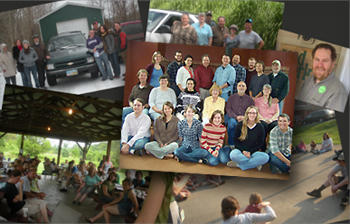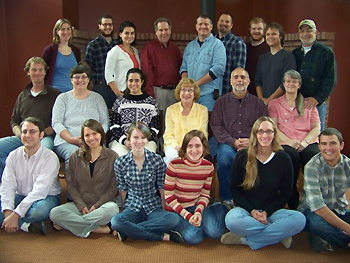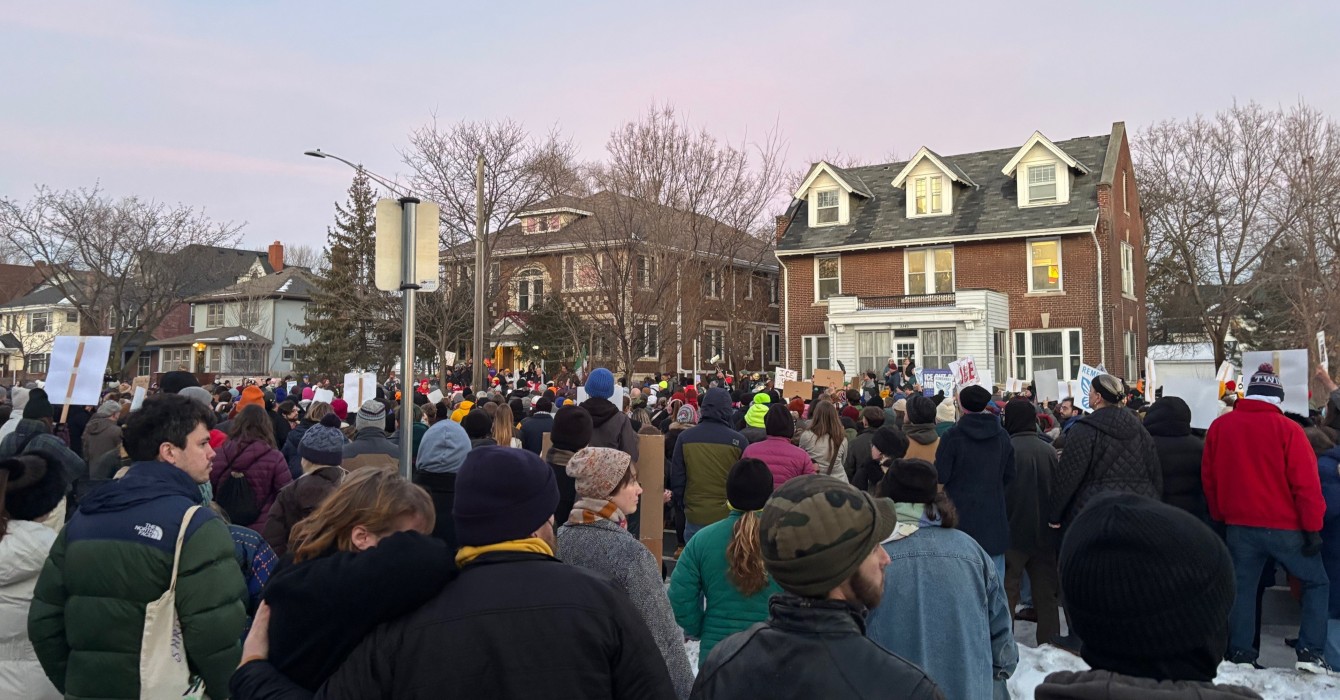Monty called Good Works Inc. in March after he was flooded out of the tent he had pitched along a river in rural southeast Ohio three weeks earlier. He had lost his job as a household mover and was struggling with alcoholism.
At the Good Works-run shelter called the Timothy House, he found a warm bed, regular meals and an encouraging staff that helped him envision a better future. Now, Monty is in his second term at a nearby community college, where he’s working toward an associate degree in heavy equipment management. He made the honor roll last quarter.
“I was at the Timothy House for three months,” he said, “and within those three months, they helped me get my papers straightened out with the IRS, enroll in college, get in to see a dentist and find transportation. It was just a bike, but I’ll tell you what, it’s come in really handy.”
Not everyone who stays at the Timothy House -- about 150 people last year -- has such an upbeat story. But many residents are helped in their struggle against poverty by this 31-year-old ministry in Athens, Ohio, a small college town in the state’s poorest region, along the western edge of Appalachia.
The ministry’s other “good works” include long-term transitional housing, weekly dinners year-round and daily lunches through the summer, a visitation program connecting seniors and young people, and help with household projects that at times are needed just to keep struggling residents’ homes habitable.
The ministry’s wide-ranging focus is impressive. But even more striking are the relationships within this close-knit community and the circle of giving and receiving that seems to touch all involved, from those assisted to the 25-member staff to the 1,100-person volunteer corps.
That is why people who know Good Works well describe it as a stellar example of how to walk alongside those in poverty.
“At a very fundamental level, a lot of their effectiveness is that they share their lives together -- with fellow staff, with volunteers, with neighbors, with people who are homeless,” said Christine Pohl, associate provost and professor of church in society at Asbury Theological Seminary. “It’s not the idea of, ‘We’re doing this for those people.’”
A little bit of light
In 1981, Keith and Darlene Wasserman had recently graduated from Ohio University, which is located in Athens. Keith had become a Christian a few years earlier. He grew up in a Jewish household in Cleveland Heights -- a four-hour drive and a world away from Athens County, where the U.S. Census Bureau reports 34.7 percent of residents live below the poverty level. (This is compared to 15.1 percent in Ohio and 14.3 percent nationally.)
When he saw people falling through gaps in the social service network, Keith Wasserman wanted to help.
The Wassermans welcomed Carol, the first guest of their ministry, into their home on New Year’s Day 1981. (Good Works doesn’t disclose the last names of its clients, to protect their privacy.)
After three years of opening their home to strangers, the couple formed a nonprofit organization and bought a four-bedroom house to serve as the shelter, which still operates as Timothy House. In 1994, Good Works purchased what is now the Hannah House and 35 surrounding acres, which gradually came to accommodate administrative offices and other structures tied to various initiatives.
“The community is very supportive. We were able to create ways for people who wanted to help their neighbors to come to Good Works and do that,” Wasserman said. “So it’s been a little bit of light added to a little bit of light and faith over time.”
The ministry grew as the vision expanded, Wasserman said, stressing how important it has been for Good Works to take on new challenges only when the capacity and proper motivation were there.
Good Works has an annual budget of about $600,000, and private donors provide close to 73 percent of its revenue. Grants make up 12 percent of the ministry’s funding and churches contribute 9 percent. The remainder comes from businesses and miscellaneous sources.
“It’s all been incremental growth, and for the most part pretty smooth,” he said. “We’ve had to be able to build within our capacity to do it well. Managing things well, with excellence, is a really important value.”
Choosing homelessness
In the ministry’s eighth year, Wasserman began living on the streets for periods of time to better understand the people he serves. He’s had nine such experiences in cities including Tulsa, Indianapolis, Jacksonville, Fla., and Lexington, Ky.
“I go when I need to understand some things that I don’t understand,” he said. “The last time I went, I was so overwhelmingly aware of … how difficult it is to eat nutritious food with regularity, because most of the food that’s donated to people who run programs is high in carbohydrates, high in saturated fat, and high in shelf life, sodium and sugar. It helped me realize the importance of getting nutritious food to people who we’re helping.”
His excursions also have taught him more about human nature -- lessons that have influenced his approach to leading and his expectations of staff and volunteers.
“People who are suffering and in poverty or homelessness can be difficult to deal with, and oftentimes they become manipulative and use manipulation to cope. And that can push your buttons if you’re running a program of some kind,” Wasserman said. “You can, when no one’s looking, act in ways that can make it difficult for them.
“When I was in Akron, Ohio, and I asked to use the bathroom, the guy said something like, ‘I just cleaned it.’ His tone of voice sent another message, which was that maybe I was going to make it dirty,” he said. “When I was in Charleston, W.Va., I asked to get my clothing, because they required us to keep it locked up, and the guy made it clear that he would get it to me when he felt like it.
“So these experiences were wake-up calls for me to be aware of how I use power and how I give power away to staff members and volunteers and sometimes to people in the program, so that we use our power for good,” he said. “This is the pledge that I ask the staff and volunteers in our community to consider: the pledge to use your power for good.”
The Rev. Joel Harbarger has seen the results of this power. He is pastor of The Plains United Methodist Church, which partners with Good Works, and he has known Wasserman since both men were undergraduates.
“They do amazing work. I’ve seen it over and over again,” he said. “I have seen folks who have had their lives transformed. They get jobs and places to stay on their own. They become productive and helpful. They’re not stuck in the cycle.”
Harbarger is most impressed by the relationships staff members, volunteers and interns develop with people who turn to them in times of need. They look them in the eye. They tell stories. They laugh.
“There’s a sense of respect and honoring the other person. They work really, really hard at treating them as if they were Christ. And that’s really understood by those who come,” he said. “In my opinion, that’s one of the hardest things to pull off with authenticity, and you can’t do it in the long term without authenticity. I think that’s the aspect that is most missing when folks provide social services to the poor -- that respect and honor. They really do live it.”
Friends in need
Like Monty, Sherilyn Weinkauf found respect and honor at Good Works at a time when she desperately needed help.
In the mid-1990s, Weinkauf found herself with nowhere to turn except Good Works. She had a 9-year-old son and a 4-year-old daughter, and her then husband had left for Alaska to follow a job lead.
Weinkauf appreciated that staff members took time to help her assess her family’s situation and explore options.
“They actually required me to work through that. And it was difficult, because I don’t like to open up to people. I just wanted to get through life and take care of my children, provide for them,” she said. “But it was good for me -- a time of growth, really. Although I couldn’t have told you that at the time.”
Good Works staff helped her apply for subsidized housing and then hired her in an administrative assistant position. Now the ministry’s office manager, she’s been a full-time member of the staff since 1996.
“Most of the organizations that I had been to for help were kind of detached emotionally,” she said. “Good Works is more of a hands-on, connecting, relational place. We don’t just see it as a job. It’s more of a calling, I guess, to help people not just receive services but to do it in a way that people feel a sense of acceptance for who they are.”
A community of hope
Good Works calls itself “a community of hope.” And for many people in this Appalachian area, it is their community.
Its Timothy House gives up to 15 homeless people at a time a safe place to stay and receive help addressing the life issues that brought them to the shelter’s doorstep. They stay anywhere from one night to several months; the average is four weeks. So far this year, about 135 people have been turned away because the house -- the only homeless shelter in a nine-county area -- was full.
“We would really rather see people stay and do things right and move into steady and consistent places than just hastily move out,” said Andrea Horsch, director of caregiving. “We don’t want to be another bed in a long line of beds that people stay in. We’re not doing something right if that’s the role we’re playing.”
The staff’s one part-time and three full-time caregivers listen to residents’ hopes, fears and circumstances and help them develop plans, navigate red tape, explore options and remain accountable.
The ministry also offers a number of other services. They created a system that invites people to volunteer in exchange for points they can apply toward groceries, furniture, appliances or even a car. They connect people in crisis with other agencies, provide household help ranging from yardwork to roofing, and create opportunities for young people to develop meaningful relationships with the elderly through regular visits.
A signature event is the weekly Friday Night Life, when volunteers provide free community dinners that regularly draw 100 to 150 people. Some folks have been coming since Good Works started the gatherings in 1993 to give former Timothy House residents a way to keep in touch. Through this and a summer lunchtime program, Good Works provides an estimated 17,000 free meals each year.
“People come just to continue to cultivate friendships and relationships and connections that they’ve made with each other,” Weinkauf said. “Someone described it as a family reunion every week.”
And the benefits aren’t just for clients and staff; volunteers also gain from their experience with Good Works.
A work retreat group from Epworth United Methodist Church near Toledo, Ohio, prepped a ham-and-green-bean casserole for one recent Friday Night Life gathering. Its members had been in Athens all week working with various Good Works clients, clearing trees alongside Heath, installing soffit with John, and sitting down to a bounty of fruit that Ann prepared after they worked on her home.
“The whole concept … about building community is really essential,” said Bob Town, who, along with his wife, Marilyn, led the retreat. “We get something out of the transaction as well. It’s a mutual, beneficial relationship.
“We’ve learned that worship isn’t just going to a church building. It’s building relationships. Everything we’re doing here, if we’re doing it the right way, is worshipping God.”
Sharing their lives
Pohl became aware of Good Works in 1989, when Wasserman audited one of her classes at Asbury Theological Seminary. Ten years later, she wrote about him in her book “Making Room: Recovering Hospitality as a Christian Tradition.”
At the time,Wasserman didn’t call what Good Works did “hospitality.” But in her book, Pohl pointed to Good Works as a prime example of the Christian practice of welcoming strangers and offering them food, shelter and protection.
She remains impressed by the ministry’s work today.
The Good Works community creates a give-and-take, she said. It encourages people to help themselves when they can. It invites those who are assisted to share their own gifts. These are life-giving aspects of hospitality, Pohl said, and too often they’re missing as organizations and agencies seek to help people at the margins of society.
“Hospitality is not just one-way. Part of it is also giving people an opportunity to contribute. That’s how people are able to recover a sense of self,” she said. “There’s recognition at Good Works that you walk alongside people and give them an opportunity to contribute.”
Monty hopes to do exactly that. He’s on track to receive his associate degree in 2013, but he might not stop there. Nine months ago he was living in a tent and wrestling with alcoholism; now he’s thinking about continuing his education and earning an engineering degree.
“They actually gave me a second chance in life, as far as I’m concerned,” he said. “Because I was done. I had given up.”
Questions to consider
Questions to consider:
- When have you experienced well-paced growth that has led to sustainability? When have you experienced poorly paced growth?
- Wasserman lives on the streets to understand the lives of the people he serves. How do you learn about the issues faced by those you (and your institution) serve? Does your information-gathering strategy teach you to empathize?
- What are the limits/boundaries you have established to ensure quality ministry?
- Where do you observe community support and mutual dependence in your work?









